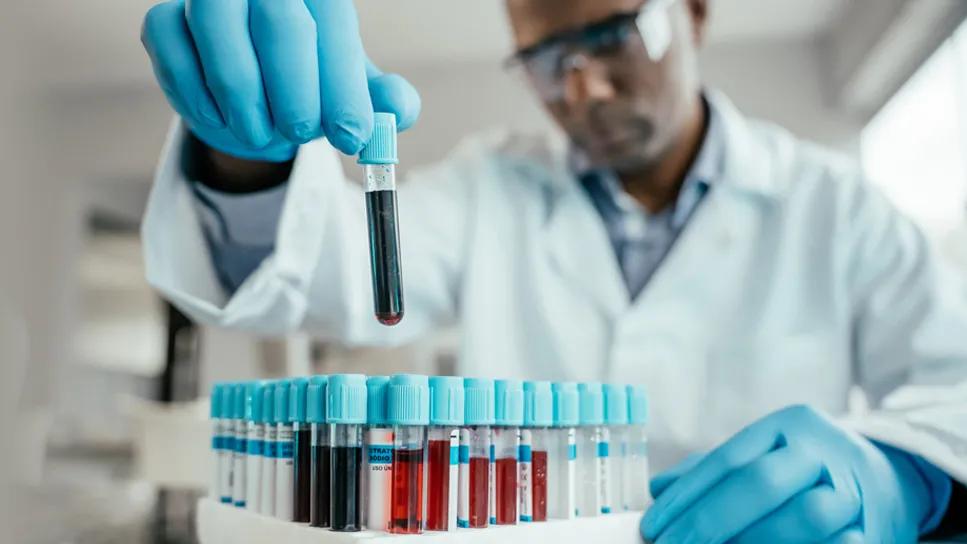Early, individualized diagnosis and comprehensive management key to preserving fertility

Hemoglobinopathies and bone marrow failure have deleterious effects on the male reproductive system. Treatments for these red blood cell (RBC) dyscrasias – and potential cures such as bone marrow transplantation – also can be gonadotoxic.
Advertisement
Cleveland Clinic is a non-profit academic medical center. Advertising on our site helps support our mission. We do not endorse non-Cleveland Clinic products or services. Policy
Those are two of the main takeaways from a new review about the myriad ways in which non-malignant RBC disorders influence male fertility, according to first author Bryan D. Naelitz, MD, MS, a urology resident at Cleveland Clinic. The review, “The Effect of Red Blood Cell Disorders on Male Fertility and Reproductive Health,” was published in Nature Reviews Urology.
“A variety of pathophysiological mechanisms have been implicated in the association between RBC disorders and infertility in males, as have therapies for the dyscrasias,” says Dr. Naelitz. “For affected patients, coordinated care across specialties, including prompt referral to a reproductive urologist, is important so that their fertility concerns can be properly evaluated and managed.”
Prevalence of male infertility may be as high as 10%, according to some estimates, and epidemiologic studies suggest that declining sperm counts are an issue globally. Thus, the need to identify men with fertility issues and treat them promptly continues to grow.
Common benign RBC disorders associated with male infertility include hemoglobinopathies, systemic iron imbalances, bone marrow failure syndromes and nutritional deficiencies. Physical, hormonal and pathophysiologic features of these conditions are described in the new review, as is the limited evidence available about alterations of fertility markers and reproductive health in males.
The authors also discuss considerations for evaluation and treatment of men with RBC disorders who are seeking fertility care. Says senior author Scott Lundy, MD, PhD, a Cleveland Clinic urologist and male infertility specialist. “Our hope is that the information we’ve provided will equip clinicians to evaluate, assess and optimize reproductive success in this unique cohort of male patients.”
Advertisement
Key linkages between RBC disorders and male infertility that clinicians need to be aware of, according to the authors, include:
“Studies show that men with SCD have impaired spermatogenesis at baseline,” says Dr. Naelitz, “and at least 1 in 4 also have testosterone levels <300 ng/dL, which can compound primary testicular dysfunction.”
Medical therapy for SCD, too, may contribute to male infertility – depending on the timing. “Treatment with hydroxyurea can lead to aberrant spermatogenesis in adults, but exposure before puberty doesn’t seem to affect future semen parameters,” notes Dr. Naelitz. “Bone marrow transplantation, while potentially curative, exposes patents to gonadotoxic conditioning chemotherapy and total body radiation. Therefore, men considering it should be offered sperm cryopreservation.”
An additional consideration in male patients with SCD is priapism triggered by vaso-occlusive events, which occurs in as much as 45% of this population. “Taking a thorough history in males with SCD is crucial to determine if they’re experiencing priapism, what may be triggering it and provide guideline-directed therapy.”
As many as two-thirds of men with ß-thalassemia major experience irreversible gonadotrophic cell damage that delays puberty and decreases fertility as a result of excessive hemosiderin deposition. Altered sperm parameters are seen in more than half of patients with transfusion-dependent thalassemia.
Advertisement
Says Dr. Naelitz, “Males with thalassemia who have fertility concerns should undergo a thorough history and physical examination to ensure they’ve reached physical maturity. A semen analysis and laboratory testing also are necessary to assess for anemia, iron overload and HPG axis integrity. Medical therapies such as clomiphene citrate and anastrozole may be helpful for fertility preservation in patients with hypogonadism.”
In males with hemochromatosis, atypical semen and hormone parameters may occur. Treatment of infertility in such patients typically involves management of iron overload with phlebotomy. Studies suggest that initiation of phlebotomy before age 30 years in males with hemochromatosis may improve semen parameters and testosterone levels.
“A reasonable course of action for male patients with hemochromatosis who have fertility concerns would be to perform a semen analysis to assess sperm quality and order hormonal tests to assess for HPG-axis dysfunction,” says Dr. Naelitz. “A CBC, comprehensive metabolic panel, iron tests and ferritin levels also should be carried out in collaboration with a hematologist.”
For patients with bone marrow failure syndromes, such as Fanconi anemia, fertility treatment can be challenging. Males typically have markedly reduced fertility secondary to a dearth of spermatogonial stem cells, which results in azoospermia. Cryopreservation prior to BMT is not possible for prepubertal patients and testicular tissue cryopreservation is only available through a research protocol.
Advertisement
“Clinicians should offer early reproductive and genetic counseling to males with Fanconi anemia,” says Dr. Naelitz. “In these patients, congenital abnormalities involving the genitalia, such as micropenis, absent or undescended testes and renal anomalies, are common.”
Advertisement
Advertisement

What’s coming up at ASH and beyond

Key considerations when diagnosing and managing severe hyponatremia

Study demonstrates ability to reduce patients’ reliance on phlebotomies to stabilize hematocrit levels

Reproductive urologists publish a contemporary review to guide practice

First-in-human phase 1 trial induced loss of function in gene that codes for ANGPTL3

American Urological Association presentation outlines the latest evolution of treatment protocols

Combination therapy doubles the number of meaningful spleen volume responses over monotherapy

Combination therapy may help address underlying disease